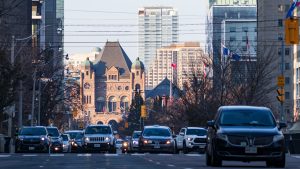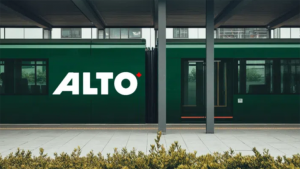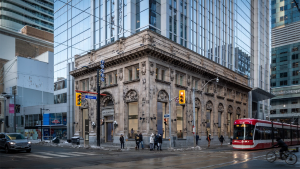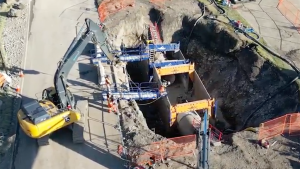Ontario Premier Doug Ford and his Progressive Conservative Party were an easy target for barbs during a recent Transport Futures provincial election debate given that the PCs declined to participate in the event.
Candidates Jessica Bell of the NDP, Laura Mirabella of the Liberals and Dianne Saxe of the Green Party found a lot to criticize in the PCs’ highway-heavy platform, which Saxe, who is vying for the University-Rosedale seat in Toronto, referred to as 20th-century thinking.
Event host Martin Collier, founder of Transport Futures, introduced the May 25 debate as an opportunity for the three opposition parties to engage in a much-needed deep dive on transportation policy amidst what appears to be universal support for the Ford government’s transit priorities.
“In general parties will substantially increase spending on multibillion-dollar megaprojects and electric vehicle manufacturing while reducing costs for drivers,” said Collier. “Unfortunately, there have been few details on whether policy decisions are evidence-based and if the status quo can really change over the next four years.”
The candidates differentiated themselves on the Highway 413 project, with Saxe claiming the Greens were the first to oppose the project with the Liberals and New Democrats merely stepping in line; and on road tolls, which the Greens support and the New Democrats oppose as too administratively costly, regressive and ineffective.
The Liberals have no particular policy on road pricing other than their two-year buck-a-ride transit plan which, Mirabella pointed out, would result in a massive switch in commuter behaviour.
“Transit is the best way to avoid those sprawling subdivisions along the 413,” said Mirabella.
Moderator Scott Butler, executive director of the Ontario Good Roads Association, pressed the candidates to state whether they would leave the government’s transit centrepiece, the $28-billion-plus Toronto subway plan with its four large projects, intact.
The Liberals would, but Bell and Saxe hedged.
Endless quibbling over transit plans has meant nothing gets built, Mirabella said.
“They have been planned, communities are counting on them,” said the Thornhill riding candidate of Toronto’s major projects. “We are fully committed to proceeding with all the transit projects that are on the table right now. We are also committed to looking at our transit networks across the province and assessing where those gaps are and working with municipalities to make sure that we can fill those gaps.”
Bell said the New Democrats are opposed to P3s but as P3 contracts are awarded it’s not advisable to spend millions in court to fight those awards.
As for the projects themselves, Bell said the Ontario Line makes sense but she is concerned the government will use “dinky little tiny trains” with the promise of running them every 30 seconds then reneging on the pledge.
“I think he should build the Ontario Line,” Bell said of Ford. “The route should suit the public interest. We should make sure it’s fully integrated into the TTC, it costs the TTC fare to ride and it is publicly delivered.”
Saxe said all transit projects the Ford government has committed to are “stupid” but like Bell, she is keeping tabs on project awards with a commitment to honouring existing contracts.
Bell is the incumbent University-Rosedale MPP. An NDP government, she said, would ensure Ontario’s transportation sector is reformed so that it is sustainable and fast.
“In order to do that, we will move forward with key legislation provincially and work with municipalities to plan our cities and our regions well, to say no to urban sprawl and yes to increasing density and building the communities and the neighbourhoods we are in by having a sensible housing plan, and that is about transit.”
Community benefits agreements would be tied to each transit investment.
“We are creating made-in-Ontario jobs, not just in infrastructure creation but also in the production of subway vehicles, buses and streetcars as well, that helps our economy,” Bell said.
Mirabella said the Liberals take an integrated view focusing on the intersection of healthy, livable communities and transit, and good transit is the best way to create those livable communities.
“We need to do that by having transit in every corner of this province,” she said.
“We need to have it affordable. We need to have it integrated and seamless and we are committed to taking the next 18 months to do a reset to provide some affordability by reducing those transit fares.”
The Liberals are committed to having zero-emission vehicles only on the market by 2035.
Saxe said only her party is strictly anti-highway. Ontario can’t afford to “keep repeating 20th-century mistakes like highways and sprawl,” she said.
“The price is way too high,” she said, in costs, health, congestion, air quality and dependence on foreign oil.
The province has to invest in alternative infrastructure including bike networks and buses so that transportation becomes “faster, cheaper and more convenient than driving a personal car,” said Saxe.











Recent Comments
comments for this post are closed